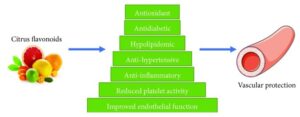Greens Hx part 2
Dr. Claire Arcidiacono, ND
In our last blog we were talking about how one of our most popular supplements can be beneficial for our heart. This supplement was Greens Hx and we will be continuing this exciting topic today! So let’s start off with talking about citrus bioflavonoids. To being just what are citrus bioflavonoids? Bioflavonoids are compounds that are found in different fruits, vegetables, chocolate and even tea and coffee! Bio flavonoids are flavonoids that are beneficial to our health in some way. As you can probably grasp from the name citrus bioflavonoids come from citrus fruits such as oranges, lemons and even grapefruit. (1) Studies have found that citrus bioflavonoids have a number of benefits for heart health and even circulation. For example studies have found that they can help to modulate lipid metabolism, improve cardiovascular outcomes and even suppress inflammation. In fact they have been found to help protect against cardiovascular disease and even offer vascular protection via a number of pathways. Please take a look at the picture below. (2)

The next item has long been considered to be a superfood in its own right. And that is the amazing blueberry. To start studies have found that the antioxidants in blueberries can help to lower the levels of oxidized LDL. (3) One study found that blueberries can “significantly lower the oxidation of LDL”. (4) In one study in just 8 weeks it was found that those consuming blueberries had between a 4-6% decrease in blood pressure! (5) Other studies have also found that blueberries can help to lower blood pressure and even reduce arterial stiffness. (6) Lastly studies have found that blue berry intake is associated with a decreased risk of myocardial Infarction in both younger and middle aged women. (7)
The next item is something you might expect to find in a popular song not a blog on how Greens Hx is good for heart health. That is parsley! Props if you know the song it’s in. Anyoo moving on studies have found that flavonoid intake, such as those in parsley is associated with a decreased risk of cardiovascular disease. (8) Parsley, which is very high in certain B vitamins may also be helpful in lowering homocysteine which is a well-known marker of cardiovascular disease. (9) In one study the B vitamins found in parsley were associated with a lowered risk of stroke, coronary heart disease and heart failure! (10) Studies have also found that parsley can help to lower cholesterol levels. (11)
Alfalfa is the next item in Greens Hx. What does WebMD have to say about alfalfa? Well according to WebMD alfalfa can help to lower LDL cholesterol by reducing the rate of absorption of cholesterol in the intestines. WebMD also says that alfalfa is full of nutrients that are good for our heart. (12) Studies have found that alfalfa is helpful in protecting us from damage caused by nicotine use. (13) One interesting study on alfalfa found that over just 2 months of use there was an improvement in cholesterol levels. (14)
Rosemary may be another surprise when it comes to promoting heart health. In fact one study found that rosemary reduced the risk of heart failure following a heart attack. (15) Studies have also found that rosemary may inhibit the production of lipids and even lower our blood pressure. (16)
Bilberry has a number of benefits when it comes to heart health. Studies have found that bilberry can help to lower LDL and total cholesterol. (17) Other studies have found evidence that strongly supports the conclusion that bilberry helps to normalize blood pressure. (18) In one study that was just 8 weeks long people who used bilberry saw improvements in areas such as platelet function, blood pressure and even HDL levels! (19) According to Mount Sinai studies have found that bilberry may help to strengthen blood vessels and even improve our circulation. (20)
Lastly I wanted to mention stevia. While most people probably think of stevia as just a sweetener it is much more than that. Studies have found that stevia can help to lower total cholesterol, LDL and even triglycerides. (21) And then there are its benefits for things outside of heart health. Overall as you can see Greens Hx is an amazing formula not just for our liver and detox but for our overall heart health too. As w slowly approach the end of this exciting look at heart health I hope that it has been both educational and perhaps a little fun too! My last blog on this topic before I do a summary will be regarding cardiomegaly or an enlarged heart.
Sources:
- https://www.ncbi.nlm.nih.gov/pmc/articles/PMC9332104/
- https://www.ncbi.nlm.nih.gov/pmc/articles/PMC6431442/
- https://www.ncbi.nlm.nih.gov/pmc/articles/PMC3820045/
- https://pubmed.ncbi.nlm.nih.gov/22935321/
- https://pubmed.ncbi.nlm.nih.gov/20660279/
- https://pubmed.ncbi.nlm.nih.gov/25578927/
- https://pubmed.ncbi.nlm.nih.gov/23319811/
- https://pubmed.ncbi.nlm.nih.gov/23953879/
- https://pubmed.ncbi.nlm.nih.gov/20937919/
- https://pubmed.ncbi.nlm.nih.gov/20395608/
- https://www.ncbi.nlm.nih.gov/pmc/articles/PMC5637854/
- https://www.webmd.com/diet/health-benefits-alfalfa
- https://www.ncbi.nlm.nih.gov/pmc/articles/PMC8976666/
- https://pubmed.ncbi.nlm.nih.gov/3606731/
- https://www.ncbi.nlm.nih.gov/pmc/articles/PMC5426768/
- https://pubmed.ncbi.nlm.nih.gov/18063331/
- https://pubmed.ncbi.nlm.nih.gov/34067538/
- https://pubmed.ncbi.nlm.nih.gov/35807881/
- https://pubmed.ncbi.nlm.nih.gov/34829135/
- https://www.mountsinai.org/health-library/herb/bilberry#:~:text=Studies%20show%20that%20anthocyanosides%20may,More%20research%20is%20needed
- https://www.healthline.com/health/food-nutrition/stevia-side-effects








